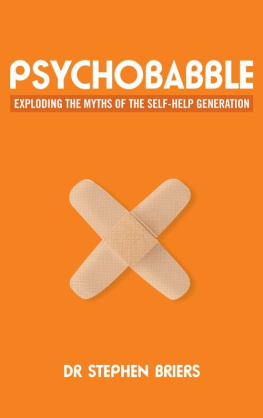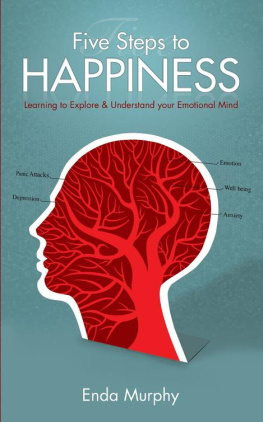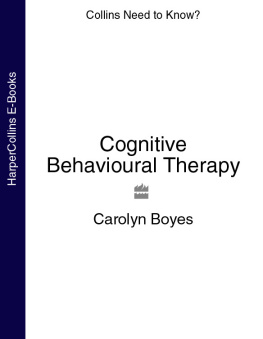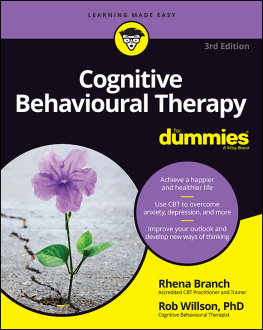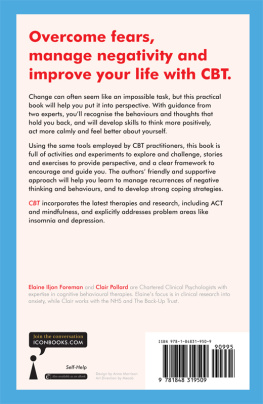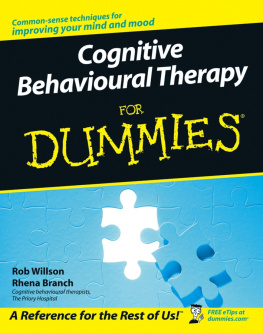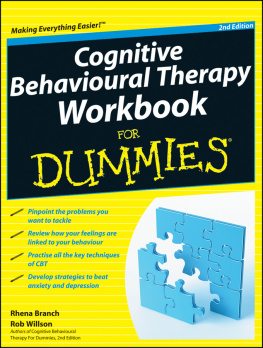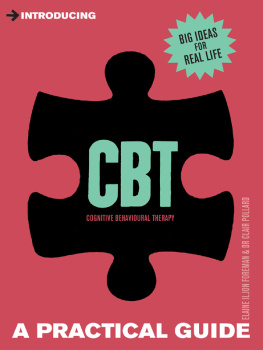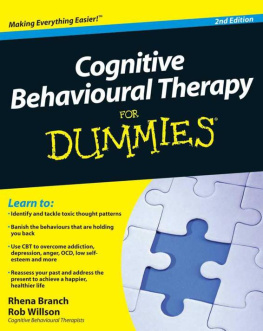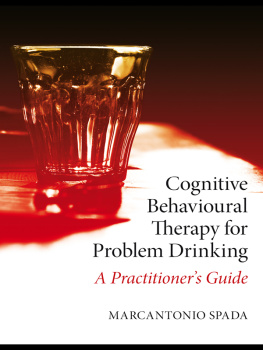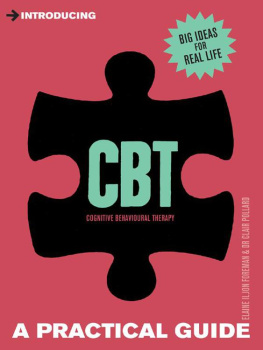Many thanks to family and friends who have put up with me during the writing of this book. I am sure we will all reframe it as the best of times! Thanks also to the publishing team at Pearson for all their hard work. I also owe a great debt to the many clients who have provided the material on which many of the case examples in this book are based. Names and identifying details have, of course, been changed. Finally, I would like to dedicate this book to you, the reader, for taking the time to read it and having the courage to aim for a better future.
Publishers acknowledgements
We are grateful to the following for permission to reproduce copyright material:
Cartoon on from Applied Cognitive and Behavioural Approaches to the Treatment of Addiction , Mitcheson, L., Maslin, J. et al. 2010. Reproduced with permission of John Wiley & Sons Ltd.
Every effort has been made by the publisher to obtain permission from the appropriate source to reproduce material which appears in this book. In some instances we may have been unable to trace the owners of copyright material and would appreciate any information that would enable us to do so.
When you think about the word therapy, what comes to mind? A few years ago the term was commonly associated with couches and tears, brooding silences and the painstaking excavation of childhood fantasies and buried memories. This was due to the influence of the school of psychoanalysis founded by Sigmund Freud in the nineteenth century, one which came to dominate popular conceptions of therapy for most of the twentieth century.
However, in recent decades a revolution has taken place. A very different model of treatment has emerged that has not only challenged many of these preconceptions, but has now successfully established itself as the most widely practised form of talking cure in the world. This model which is actually a synthesis of several different theoretical traditions is known as Cognitive Behavioural Therapy or CBT for short.
When the first edition of this book was published, CBTs star was already in the ascendant. Its meteoric rise has continued and, if anything, even been accelerating ever since. Three years on, CBT looks as if it has not only changed the face of mental healthcare for ever, but its principles are routinely being applied in schools, businesses and a variety of other non-clinical settings. CBT is definitely no longer the new kid on the block. Its everywhere and, if you have picked up this book, you will almost certainly have heard of it. When therapy is mentioned these days, people are just as likely to call to mind aspects of CBT as they are to reach for the stereotypes and clichs of Freudian psychoanalysis.
In the UK, the profile of CBT has been raised significantly by government initiatives aimed at ensuring that more and more of us can have access to CBT on the National Health Service. At the end of the six-year rollout of the IAPT (Improving Access to Psychological Therapies) programme an additional 6000 new CBT therapists will have been trained. The goal is to make sure that by 2015 every adult that requires it should have access to psychological therapies to treat anxiety disorder or depression. However, the second phase of IAPT is also seeking to make CBT more available to children and young people, those suffering from long-term physical conditions, unexplained medical symptoms and even people with severe mental illnesses. CBT is increasingly regarded as the treatment of choice for an ever-expanding menu of mental health problems by the National Institute of Clinical Excellence (NICE). Pioneering studies have recently been exploring the role of CBT in alleviating symptoms of epilepsy, heart disease, back pain, breast cancer and even menopausal hot flushes. It seems that scarcely a week passes without news of CBTs successful application to yet another new problem or client group.
Innovative new ways of delivering CBT are also being developed all the time. In January 2012 an article in The Lancet reported on a small-scale study providing CBT interventions through videoconferencing and mobile phones. Even more intriguingly, a team from the University of Auckland has recently created a computer-based fantasy, role-playing game called SPARX designed to help young people learn skills to combat the symptoms of depression. If you fancy, you can take a look at the SPARX trailer for yourself on YouTube. Several websites now offer computerised CBT packages online and there are some excellent smartphone applications available to help you put CBT techniques into practice. If you are interested, you can find an overview of some of these in Appendix 1 at the end of this book.
This book aims to introduce you to both the theory and practice of CBT so you can start applying this powerful tool in your own life. The following pages will help you to:
- appreciate some of the distinctive features of the cognitive behavioural approach
- familiarise yourself with CBTs basic principles, methods and models
- learn how to structure your own problems within the framework that CBT offers
- spot unhelpful patterns of thought and behaviour that may be contributing to your difficulties
- create practical, step-by-step strategies for tackling your problems using established cognitive behavioural techniques.
As you progress there will be exercises to help you develop your understanding of CBT techniques and the main points will be illustrated using real-life examples. I have also included some trouble-shooting tips to help you achieve the results you want.
The origins of CBT: giving Freud the slip
Turning on the intercom: this is how Aaron Temkin Beck described the breakthrough responsible for the evolution of CBT. In the 1960s Beck was an established (if rather frustrated) psychiatrist attempting to treat his patients using Freudian psychoanalysis. While Freuds methods emphasised the importance of unpacking repressed conflicts from the past, Beck became convinced that for many of his patients the crux of their problems lay more in what they were telling themselves in the present.
He took up this line of inquiry when one of his patients admitted a number of anxious thoughts about how the consultation with Beck was going. The patient noticed several thoughts of the following kind running through his head:
- I am a bad patient .
- Dr Beck will be disappointed in me .
- I am just wasting his time He will probably want to stop seeing me
Beck became convinced that, whatever their original source, it was this anxiety-laden commentary that was driving his patients unpleasant emotions in the here and now. For Beck turning on the intercom meant giving patients and therapists access to their internal monologue the stream of characteristic fleeting thoughts that raced through their heads whenever they felt depressed, anxious or unsure of themselves.


